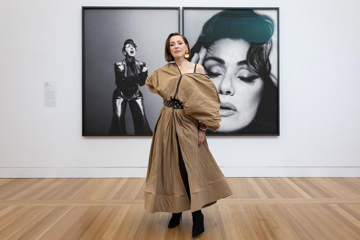Papa Preaches
"I find it kind of strange that we live in this age where we’re so blinded by information and stuff that we don’t look at anything but ourselves."

"Someone said that they had a dream that their dad killed their mum and then buried her in a cereal box in the backyard, which was kind of odd.”
Two members of Papa Vs Pretty, 22-year-olds Thomas Rawle and Tom Myers are lounging around The Music's office, talking about the weirdest message they received as part of their Smother hotline. They had a phone line running into the studio and planned on having recorded messages left by strippers (“Hi, my name's Tiger, I'm a size...”) on the track itself, but weren't able to nab the rights to the sound bites. So instead they used the hotline to ask fans questions. Those same fans were later able to call the hotline to hear Smother for the first time, before leaving the band a voicemail.
Frontman and lead guitarist Rawle explains the concept: “Obviously with social media, anyone can contact you via the web, but it's not as personal as someone actually calling you. It's quite strange.” Drummer Myers interjects, “We'd call them back, too. We'd pick a couple and we'd call them back and be like 'Hi, this is whoever, thanks for calling in', and that was always a nice little thing to do in the studio.”
Papa Vs Pretty have since emerged from the studio with their hotly anticipated second album, White Deer Park, in hand. After all, the band gained a lot of momentum with their 2011 debut United In Isolation (released when they were only 18), which was nominated for the ARIA for Best Rock Album. They don't feel pressured to measure up to their first record though.
Don't miss a beat with our FREE daily newsletter
“There's no real pressure,” Rawle says. “Everyone says there's pressure but you just have to decide whether you want to feel that or not... We wrote a lot of songs, did a lot of work, we had a new guy join the band, Luke [Liang].”
“[It was about] getting back to the basics of being a band and getting into a room together and playing together,” says Myers. “And with the new guy Luke, getting to know the way he plays and how he functions in our group. I thought that was one of the most important things that we did over the whole period, getting into a room for four days a week to play and work on songs that were going to end up on the album.”
During their time in the studio they recorded 80 songs, then culled the list down to the best 14. Lyrically speaking, Rawle wanted to interrogate two main concerns: the first was what he calls our current “culture of apathy”.
“I find it kind of strange that we live in this age where we're so blinded by information and stuff that we don't look at anything but ourselves,” Rawle says. “Even if you have all this information thrown at you, it's kind of all in relation to you... And for me I found that really alarming because I started to feel really lonely and I felt that everyone was drawn up in this kind of not-real world… People are getting gradually more narcissistic and apathetic, and it's less cool to be passionate. It becomes more cool to just not do anything.”
The other was the mechanics of modern relationships. “I'd just come out of one and I kind of tried to analyse the concept of a relationship in the sense that you kind of hold on. Life is temporary, right, and I find myself in relationships where I'm holding on and I realise that it's kind of an inability to accept one's own mortality. It's like, 'This is going to last forever', and it doesn't and you won't last forever so what's the point of holding onto something that's not working?”
Rawle has his philosophy for working as a musician. “If you're making music, you want to be doing it to progress as a songwriter. I feel as a songwriter or an artist or anything, like a filmmaker or a painter or an author or whatever you're doing, what you should be doing is try to seek some kind of truth that benefits society culturally and increases empathy… My biggest ambition as a songwriter is to be able to eloquently summarise big things that I find undeniably huge and also unsummarised.”
He concludes, “Your duty as a songwriter, because you don't exist in a corporate structure as obviously as everyone else, is you have the opportunity to be a free mind totally, and analyse and try and make sense of these things and eloquently describe them through your perspective. And that's all we ever try to do, and whether it's useful or valuable is debatable.”







